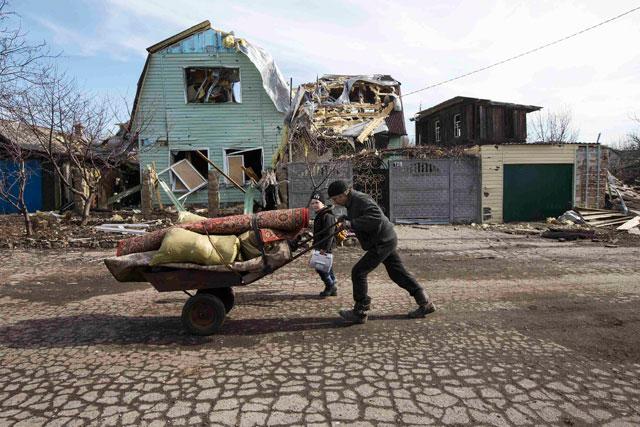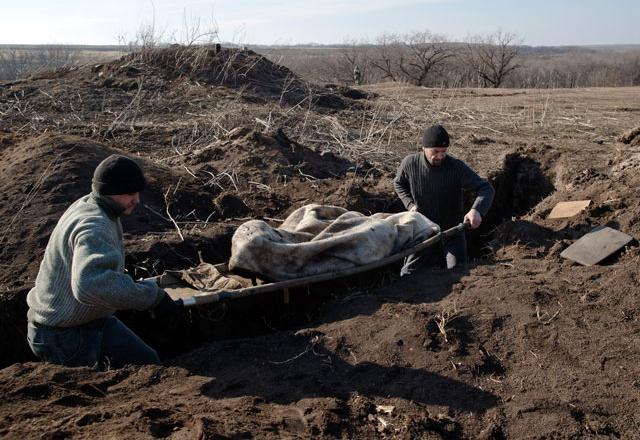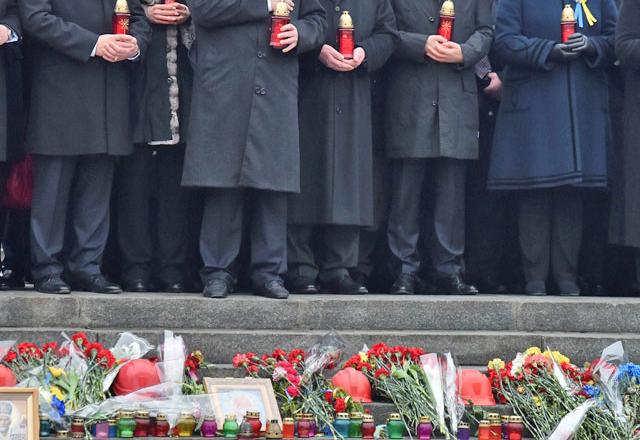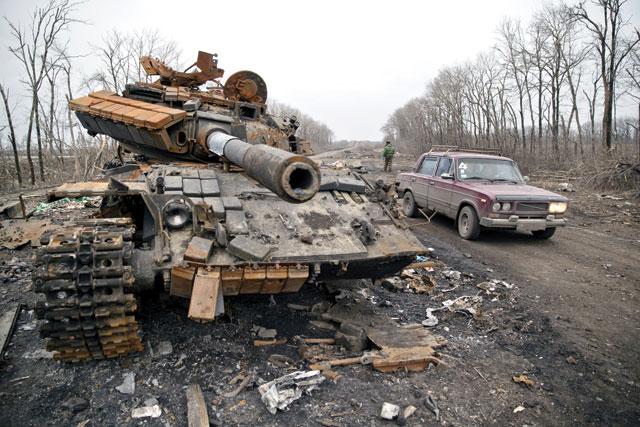You are here
Ukraine says pulling back arms as US, Russia trade barbs
By AFP - Feb 26,2015 - Last updated at Feb 26,2015

ARTEMIVSK, Ukraine — Ukraine's military on Thursday said it had started the withdrawal of heavy weapons from the frontline, bolstering a stuttering peace plan as the United States and Russia traded barbs over the conflict.
The announced pull-back — a key part of a peace deal negotiated earlier this month —comes after a shaky truce that was meant to come into force on February 15 but only took hold across the conflict zone in recent days.
"Ukraine is today [Thursday] beginning the withdrawal of 100mm cannons from the frontline," the army said in a statement.
"This is the first step in the pullback of heavy weapons and will be carried out exclusively under the supervision and verification of the OSCE [the Organisation for Security and Cooperation in Europe]."
An AFP photographer saw Ukrainian forces on Thursday towing at least 15 cannons away from the frontline around the strategic town of Debaltseve.
The arms withdrawal, which is meant to create a buffer zone between the two warring sides, is due to be completed within two weeks.
Rebels insist they have already pulled back the majority of their artillery, rocket launchers and missile systems from some areas.
Fighting dies down
But while OSCE monitors have reported seeing some big guns heading away from the rebel lines, they say the warring sides have not provided information needed to determine what, if any, arms withdrawals have occurred.
Fighting has died down dramatically over the past few days. Ukraine's military said for the second day running that there were no fatalities among its soldiers but that four had been wounded.
NATO chief Jens Stoltenberg hailed the downturn in violence but kept up the pressure by calling for Moscow to pull out of Ukraine the weapons it is accused of sending in to the rebels.
"Russia has transferred in recent months over 1,000 pieces of equipment — tanks, artillery and advanced air defence systems," Stotenberg said in Rome.
"They have to withdraw this equipment and they have to stop supporting separatists."
The words highlighted the unabated tensions between the West and Moscow.
Addressing US lawmakers on Wednesday, Secretary of State John Kerry said Russia and pro-Moscow rebels had failed to meet the terms of the ceasefire.
Russian President Vladimir Putin had put in place policies that "violate all the international norms with respect to territory and behaviour", Kerry said.
"He has empowered, encouraged and facilitated directly land grabs in order to try to destabilise Ukraine itself.
"To date, neither Russia nor the forces it is supporting have come close to complying with their commitments," Kerry added, renewing warnings that Moscow could face further sanctions.
But Moscow says threats of new punishment are evidence that the West is not interested in the success of the latest effort to stop fighting that has cost at least 5,800 lives since April.
"Behind these calls lies the unwillingness of these figures, these relevant countries, the United States, the European Union, to seek the implementation of what was agreed," Russian Foreign Minister Sergei Lavrov said.
Russia has itself ratcheted up the pressure by warning it could cut off gas supplies to Ukraine -- and, by extension, to parts of the European Union.
Putin said Wednesday that Ukraine had paid only enough for three or four more days of gas deliveries and that state-run energy giant Gazprom would "terminate the supply" if it didn't receive money quickly.
Ukraine's gas company Naftogaz said a meeting between Ukraine, Russia and the European Commission would take place in Brussels on Monday to examine the dispute.
The West says the best hope for a negotiated solution to the 10-month conflict lies with the truce, which last week won unanimous backing from the UN Security Council.
But breaches by rebel forces — especially their assault on Debaltseve, a strategic transport hub, and attacks on Ukrainian army positions near the port city of Mariupol —have exasperated the EU and US.
British Prime Minister David Cameron this week announced his country will send up to 75 soldiers to Ukraine on a “training mission” but that they would not operate in the conflict zone.
Up to 2,000 Russian soldiers were, meanwhile, taking part in drills near the Russian border with Estonia and Latvia, in a show of strength likely to alarm the EU neighbours.
Related Articles
Ukraine said Saturday that isolated clashes were punctuating a shaky truce with pro-Russian rebels after international monitors warned that the conflict in the country stands at a "crossroads".
A bomb killed two people during a pro-government march in the east Ukraine city of Kharkiv on Sunday, officials said, as Kiev's army and rebels wrangled over a truce requiring them to pull back heavy weapons.
The US and Russian foreign ministers expressed cautious optimism after holding talks in Geneva Monday to end fighting in Ukraine, where the UN says more than 6,000 people have died in less than a year.

















